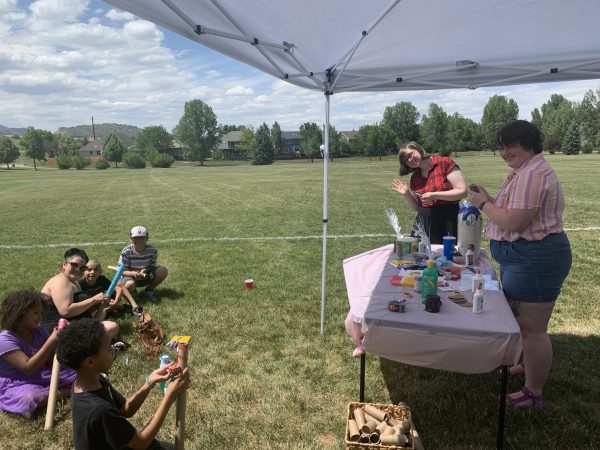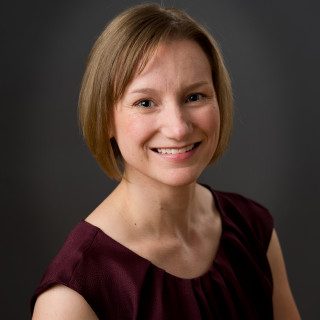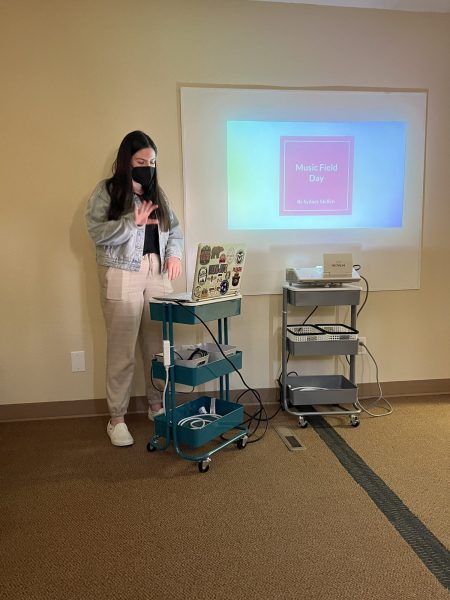
During her clinical internship this summer, recent graduate Sydney Steffen was able to build upon the skills she learned as an undergraduate as she discovered her own personal therapeutic approach to music therapy. “My practicum gave me valuable hands-on experience with feedback from experienced professionals in the field to best advance my clinical skills,” says Steffen.
The clinical internship is the culminating course of the undergraduate program in music therapy at Colorado State University. Students in their final year of study are eligible to apply for a National Roster or University-Affiliated internship where they demonstrate the knowledge, training, and skills gained throughout the music therapy program in a clinical setting. Clinical skills pertain to anything a music therapist does while working in a clinical setting and interacting with their clients, including providing directions, structuring the environment, leading a music therapy experience, delivering music therapy interventions, and completing assessments.
Dr. Lindsey Wilhelm, music therapy internship coordinator at CSU, said, “Students may seek out opportunities to work in one or more settings where they may or may not have had previous experiences. It gives the students real-life experience in being a music therapist so they can be successful in a music therapy position or other job.”

“Students may seek out opportunities to work in one or more settings where they may or may not have had previous experiences. It gives the students real-life experience in being a music therapist so they can be successful in a music therapy position or other job.”
-- Dr. Lindsey Wilhelm
Dr. Wilhelm works individually with students to identify specific parameters to narrow their search.
Steffen’s internship took place at a local private practice, Integrated Therapy of Northern Colorado. During her six-month internship, Steffen observed, co-treated, and led both individual and group sessions with children and adults with varying intellectual and developmental disabilities under the supervision of professionals at the practice. She also conducted several research projects and assignments to supplement her educational growth. In addition to written, verbal, and decision-making skills, Steffen was able to utilize guitar, piano, and voice talents as well.

“Most notably, I completed a final project where I wrote and received a grant to host a music field day in my neighborhood that helped to bring my community together and advocate for music therapy!” Steffen said.
According to Wilhelm, the depth or breadth of the experience and training varies across internships. “Some internships ask the intern to work with one population or age group, such as a school system, and the intern develops a deep level of expertise in that one area. Others, like a private practice, can offer the intern experience in a breadth of populations and age groups, but maybe with less depth in a particular area,” she noted.
Working with a team of six music therapists not only helped Steffen improve her verbal skills when providing client feedback, but she felt supported as she developed and implemented her treatment plans. “I have learned ways to address sensory and communication needs with the clients by expanding my communication styles and learning more about the sensory system,” Steffen says. Most importantly, “they taught me how to have a great time and build lasting relationships.”
Clients can participate without any experience in music or an ability to read music. "The great thing about music therapy is that you do not have to have any musical background to participate! We often will utilize unpitched percussion instruments or adapt pitched instruments to allow clients to play,” Steffen explained.
Steffen leading "Uniquely You," a group session with children and adults with varying intellectual and developmental disabilities.
Snapshot: Music Therapy Internships
CSU music therapy student internships occur at private music therapy agencies, school districts, long-term care/residential facilities for older adults, hospitals (children, adult, rehabilitation, palliative care), hospice agencies, and non-profit community organizations.
To acquire a job in music therapy, students must pass the board certification exam, which is overseen by the Certification Board for Music Therapists. According to Dr. Wilhelm, CSU students have a very high pass rate of the board certification exam [following their internships] - recently, above 90%.
Dr. Lindsey Wilhelm, a 2020 recipient of the Exceptional Achievement in Service-Learning Instructional Innovation Award, is the current internship coordinator for the CSU Music Therapy program.
Music therapists are required by the American Music Therapy Association to complete 1200 total hours of training. CSU therapy students complete 180-264 hours pre-internship with the vast majority of hours coming during the six-to-nine-month internship. “These are on-the-job training hours that mirror real-life experiences and prepare the music therapy student for a professional career in music therapy,” Dr. Wilhelm said.
Already showing the dedication of a music therapist, and excited for the future, Steffen was thrilled to see how music therapy helped her clients achieve more success in their daily lives outside of therapy.
“Music therapy is a great tool that can be utilized for community engagement interventions. We can use music to help increase social skills, promote togetherness, and bring a sense of culture into our communities!” Steffen said.
The internship benefits all involved. The clients, the professors, and the interns create a collaborative team, sharing ideas and work that launches careers in music therapy.
